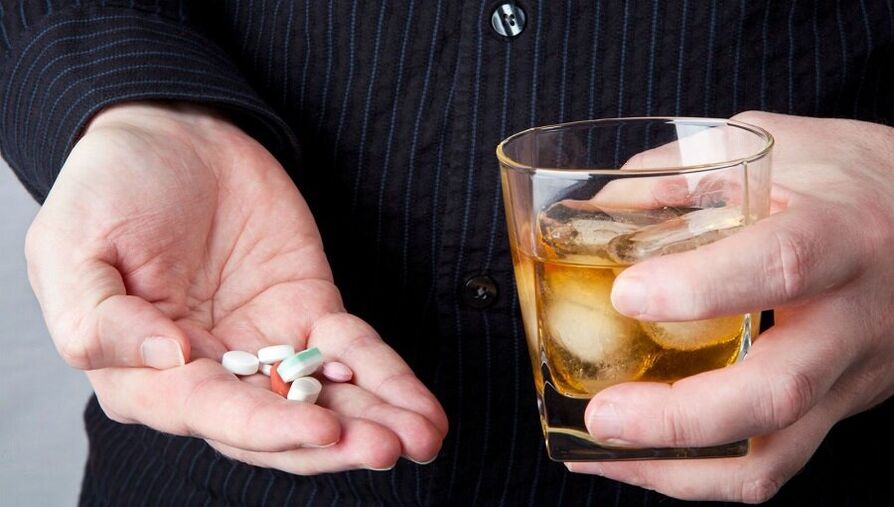Everyone knows that it is forbidden to combine alcohol and antibiotics, but few people know when you can drink alcohol after antibiotics. It is not clear how many days are expected after the last pill. Many more wonder what will happen if you throw away a few glasses during the treatment period or shortly after it is over. With these questions, we will try to find out, which in the beginning you need to get acquainted with the effects of alcohol and antibiotics on the body.

Treatment and contraindications for alcohol
Antibiotics are not only very effective drugs, but also dangerous. Their response must be agreed with the attending physician. The main indication of the need for its use is the presence of a bacterial infection, which cannot be dealt with by the body itself.
If a specialist prescribes antibiotics, then during the period of such treatment, you should adhere to a few rules:
- Strictly adhere to the timing and timing of medication intake, which will maintain a certain concentration of nutrients in the blood continuously.
- How long it takes to take the medication should be determined by the doctor. Usually the course does not exceed 2 weeks, and some medications are enough to use for 3 days.
- It is best to take antibiotics with clean water without gas.
- Throughout the treatment period, you should adhere to proper nutrition. From the diet, you need to exclude fatty foods and, of course, alcohol intake, even in small amounts.
The last rule should be taken into account, especially with respect to not drinking. Moreover, it is forbidden to consume alcohol immediately and after undergoing treatment for a certain period of time. But why should alcohol not be drunk after antibiotic treatment? When ethanol and its constituent substances enter the body, they break down into small elements, turning into simple compounds. A number of molecules of alcoholic beverages will begin to coincide with the molecules of drugs, which can cause serious damage in the body.
It has been repeatedly proven that after drinking alcohol, the effectiveness of antibacterial drugs is significantly reduced. Moreover, such a mixture will place a great burden on the liver, which responds not only well to the work of these organs, but also the state of the body as a whole. Alcohol consumption after antibiotics or during treatment can give unpredictable system and organ reactions.
Possible consequences
As already mentioned, alcohol intake simultaneously or immediately after taking antibacterial drugs affects the whole body, not limited to its own area, which is why it is impossible to predict the consequences. However, the most common are the following:
- If you drink alcohol when there are antibiotics in the body, a sharp form of allergy may appear.
- The big danger while you are taking medication is the worsening of intoxication and intoxication. After that, a normal amount of drinking can cause a loss of control. At the same time, there is a risk of getting mental aberrations as a result.
- Alcohol after taking antibiotics significantly reduces the effect of the drug, which can lead to the need to repeat treatment or increase the dose of the drug, which will also adversely affect the body. In addition, increasing the dose of the drug helps to reduce its effects in the future, and thus the adaptation of the infection to the drug. Infections with antibiotic deficiencies have time to become stronger and become resistant to them. Therefore, after undergoing antibiotics, the infection will reappear over time, and stronger medications are needed to get rid of it.
- Also, possible consequences include traditional symptoms such as: headache, nausea, mental blurring, liver damage and dizziness.
All of the above consequences can be avoided if you know when you can drink alcohol after using antibiotics.
What deadlines do you have to adhere to?
There is no exact statement on how long after taking antibiotics it is possible to drink alcoholic beverages. For each antibacterial drug, it is individually determined how many days after treatment you can drink alcohol, and this must be determined by the doctor. As a rule, this period is at least 10 days. This is the minimum period during which a person’s kidneys and liver return to normal, and the intestinal microflora is restored. However, this is a general recommendation, it all depends on the characteristics of the organism.
If the patient has chronic kidney or liver disease, then the time to drink alcohol may be slightly increased. And to avoid mistakes, it is better to consult an expert on this problem. The longer after treatment do not consume alcoholic beverages, the better for the body. However, alcohol and the like do not bring anything useful to the body, and even more so in the period it weakens.
Today, the main contraindications are studied on whether it is possible to drink alcohol during the period of antibiotic treatment, as well as general conditions regarding abstinence from drinking alcohol, which must be observed.
Adhering to these recommendations and rules, it turns out that not only quickly get rid of the disease with the help of antibiotics, but also do not harm the body. But it is important to remember that taking antibiotics without a doctor’s prescription is also prohibited.
























